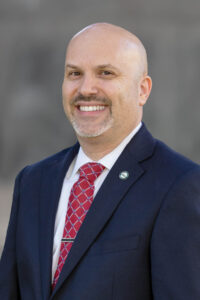
FEA President
Another school year is upon us, and I am sure we all have been hoping for the same thing — a normal school year. The past year and half have presented many challenges for our families, our public schools and our communities, and we are eager to leave Covid behind. But even when a sense of normalcy returns, some of the same challenges we faced prior to the pandemic will remain.
Florida’s public schools rank 43rd in the nation in funding. Florida’s teachers rank 48th in the nation in average pay, and that is up from 49th after the investment in beginning teacher pay that lawmakers passed in March 2020. Florida’s education support professionals are among the lowest paid in the U.S., even as some districts have begun to implement the state minimum wage amendment, which requires that the wage be $10 per hour starting this September and increase by $1 each year until Florida reaches a minimum pay of $15 per hour.

Lagging pay is nothing new to Florida, nor is the continued toll it takes on our professions. As the school year begins, we are seeing the continuation of the massive teacher and staff shortages in public schools. Districts all over Florida are struggling to keep and find teachers and staff. While one of the major contributors to the shortages is low wages, we also know that the constant undermining of our work and deteriorating working conditions play major roles.
Florida’s citizens have long supported our public schools. Florida’s Constitution requires a free, high quality system of public education for every child residing in the state. The continued expansion of unaccountable, for-profit, corporate-run charters and voucher schools fails to honor this important aspect of our Constitution. The Constitution requires that class sizes be no more than 18 students per class in grades K-3, no more than 22 students per class in grades 4-8 and no more than 25 students per class in high school. Since that amendment to the Constitution was passed, policymakers at the local and state level have done everything possible to undermine the will of the people. The Constitution also requires free, high quality PreK for every 4-year-old in Florida. Until the passage of new legislation this year, the quality of private PreK programs was suspect at best.
Two years ago, we called on lawmakers to Fund Our Future and make this a decade of progress for Florida’s children and public schools. Over 80 percent of Florida’s students attend their community public school. Parents send their kids to public school because they know that public schools are the best place for them to learn. Some lawmakers continue to undermine the work we do each day and underfund our schools so they can fulfil the narrative they are desperate to paint — a failed system. They continue to make corporate for-profit charters and voucher schools less accountable so they can deceptively paint those schools as beacons of hope. The reality, public schools are the best place for kids, and charters and vouchers, which most often put profits over kids, have failed Florida’s children and families. This failed experiment on our kids needs to end, and the best way to do that is through our united voice in your local union and the Florida Education Association.
I am confident that we can successfully fight to strengthen Florida’s public schools and our professions while pushing back on the bad policies that undermine our schools. To do that, we must build relationships with all lawmakers on both sides of the aisle, build our membership to new heights, and better communicate to our members, parents and community the greatness of our public schools and the challenges we face. If we do this, together, we will become more influential in making Florida’s public schools the best in the nation and the people who work in them, the most respected and compensated.
Andrew Spar started teaching music at a Daytona Beach public school in 1994. He was elected president of Volusia United Educators in 2003, elected vice president of FEA in 2018 and president in September 2020, after Fedrick Ingram left FEA’s top leadership position to become secretary-treasurer of the American Federation of Teachers (AFT).

